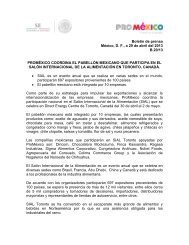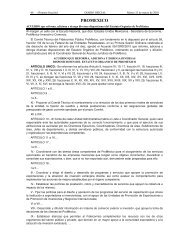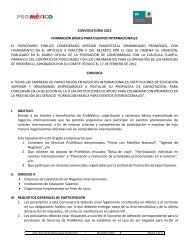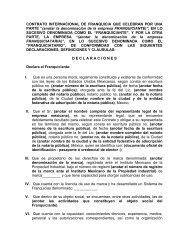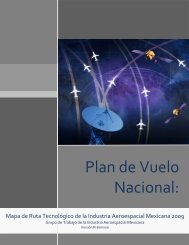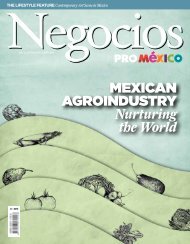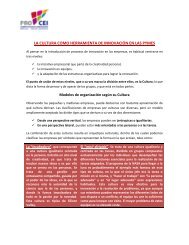MINING IN MEXICO S - ProMéxico
MINING IN MEXICO S - ProMéxico
MINING IN MEXICO S - ProMéxico
You also want an ePaper? Increase the reach of your titles
YUMPU automatically turns print PDFs into web optimized ePapers that Google loves.
the lifestyle feature Editorial Industry<br />
matched by an equally good commercial<br />
potential. Ultimately, it’s<br />
a business and we are subject to<br />
the same rules as someone selling<br />
grapefruit,” says Rabasa.<br />
Opening its Spanish subsidiary<br />
was one of the most important<br />
steps taken by Sexto Piso. Not only<br />
in terms of expanding the company’s<br />
financial growth but also due<br />
to the need for professionalization<br />
on entering the Spanish market. As Rabasa says, “in Spain there are another<br />
hundred small publishing houses producing impeccable books.”<br />
This required a graphic redesign of their books, a plan to balance out<br />
their collections (novels, short stories, essays, classics and illustrated<br />
books) and the participation, along with other publishers, as part of the<br />
Grupo Contexto, which received a prize from the Spanish government<br />
for the Best Cultural Publishing Work in 2008.<br />
Although the Spanish market is much more competitive, it also offers the<br />
opportunity given the large number of specialized bookstores that enable<br />
their catalog to be on display for longer. If Spain currently reflects 30% of<br />
their total sales, compared to 60% in Mexico and the remainder in South<br />
America, mainly in Argentina and Chile, Rabasa hopes that sales in Spain<br />
will increase over the coming years until they match those in Mexico.<br />
On The Meaning Of Being “Alternative”<br />
Textofilia was the creation of a group of literature students at the Ibero-<br />
American University who began to publish a magazine on literature and<br />
contemporary art. “Unlike other publishers, we had no start-up capital. Our<br />
only investment was our work, our time, and as we were still undergraduate<br />
students I reckon we didn’t start at zero, but from minus ten,” jokes Alfredo<br />
Núñez, editor in chief of Textofilia. It was originally a magazine. But over time<br />
the team grew, it became an almanac and a publishing house was born, beginning<br />
with poems and fragments of text by Anacreon.<br />
Why publish a Greek poet from the sixth-century b.C. “Textofilia<br />
is interested in archaeology through literature, to rescue authors who<br />
unfortunately do not appear in their own special editions, except in<br />
anthologies of classical poetry,” Alfredo Núñez says. It therefore seeks<br />
to be a new alternative in the Mexican publishing industry. “What we<br />
saw was that on an international level people’s taste was being defined<br />
by what was commercially viable<br />
and quick to produce. This<br />
led to a homogenous glut of junk<br />
books or works that sought to<br />
fill a niche and then flooded that<br />
niche,” explains Núñez.<br />
But creating an alternative<br />
selection of works is not the only<br />
requirement when developing<br />
their business. Small publishing<br />
houses have had to diversify in<br />
order to compete. Textofilia, like<br />
other publishers, is now involved<br />
in distribution, which apart from<br />
cutting its own costs, provides extra<br />
income for it to work on other<br />
Diego Rabasa, a partner in Sexto Piso, a<br />
Mexican publishing house that produces<br />
around twenty-five works a year and<br />
exports its catalog to South America and<br />
Spain, believes that the publishing business<br />
gives results over the long term. The keys to<br />
success: quality and consistency.<br />
publications, such as La Tempestad<br />
or Literal- Latin American<br />
Voices magazines, books of the<br />
Fundación del Centro Histórico<br />
de la Ciudad de México publishing<br />
fund or the Diamantine publishers.<br />
They have also teamed<br />
up with other publishers to develop<br />
alternative sales strategies,<br />
such as “evening sales.” On one<br />
occasion, they managed to entice<br />
four thousand people to the Centro<br />
Cultural España.<br />
Small publishers do not have<br />
as many resources to promote authors<br />
or place advertisements in<br />
newspapers but nor do they need<br />
to play the same game as the large<br />
publishers with their constant<br />
search for the new.<br />
Their work involves a slow and<br />
careful process of selecting books<br />
to create a long-term catalog, setting<br />
up independent distribution<br />
networks and buying the rights to<br />
high quality works that have not<br />
been published in Spanish.<br />
It is the quality, rather than the<br />
size, that matters. n



